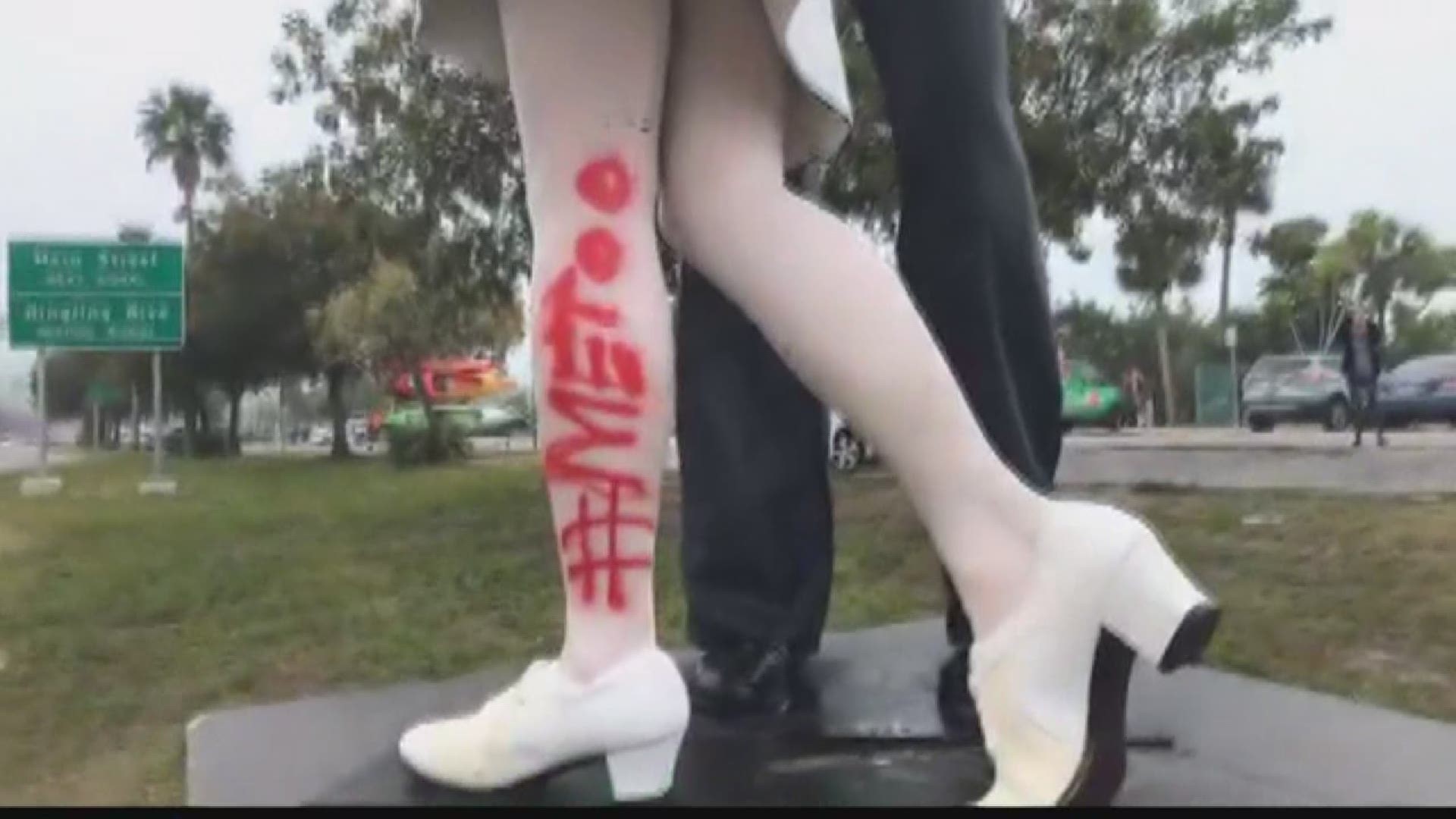It's more than just vandalism. It's a rallying cry.
On Tuesday, members of the Sarasota Police Department were dispatched in reference to a vandalism call on the Sarasota Bayfront. When officers arrived, they found the words "#MeToo" spraypainted in bright red on the Unconditional Surrender statue.
The message came less than 24 hours after the sailor depicted in the statue, George Mendonsa, 95, passed away at an assisted living facility on Rhode Island. The motif, originally in the form of a photo taken by Alfred Eisenstaedt, became one of the most famous images of the 20th century.
Still, it’s no coincidence that the oftentimes controversial #MeToo would be splayed on the legendary display.
Over the course of the statues' history in Sarasota and elsewhere (there are multiple versions of the statue all over the U.S.) the statue has raised some eyebrows. While many view it as a joyous moment shared between two lovers after a war, there are sources who say that the moment may be less than consensual.
In an interview with Greta Zimmer Friedman, the woman who is depicted in the iconic statue and photo, the Veterans History project asked her about the experience. She told them she had absolutely no idea who the man was.
“I felt he was very strong, he was just holding me tight, and I'm not sure I -- about the kiss because, you know, it was just somebody really celebrating,” Freidman said.
“But it wasn't a romantic event," she said. "It was just an event of 'thank God the war is over' kind of thing because it was right in front of the sign.”
According to the New York Times, Friedman died of pneumonia in 2016, just one year after this interview. In her obituary, the NYT referenced the dark undertones that the photo had.
The obituary also mentions a writer for Crates and Ribbons who even went as far as to say that the picture portrayed “The Selective Blindness of Rape Culture.”
But why the message of #MeToo?
Fast forward to 2018, and people are becoming more aware of "rape culture", largely perpetuated by the infamous "Me Too" hashtag. #Metoo was sparking a movement on social media, allowing men and women to come forward with their stories of sexual assault, harassment and molestation in a safe space.
From all over the world people tweeted furiously their support for the movement, their personal stories or just simply "#Metoo."
As more and more survivors found their voice, a movement grew. Offering a much-needed sense of validation and freedom for individuals who were willing to share their story. Validation and freedom that may have been lacking in the early years of the 1940s when the iconic kiss picture was taken.
We have to think back to remember the time period. While it's true that American women were assuming more responsibilities because of the war, we were still living in a different era.
Some examples of that include:
- In 1945, America was still 20 years away from legally prohibiting sex discrimination in the workplace.
- Women were not automatically registered for jury duty, due to Supreme Court ruling that their job of being "the center of home and family" and not in the courtroom.
- We were still 30 years away from the Pregnancy Discrimination Act which bans employment discrimination against pregnant women.
In theory, the iconic kiss photo, taken right on the cusp of the second wave of the Women’s Rights Movement, probably had different insinuations than what has today.
What may have been deemed innocent back then to some, has taken on a whole new meaning. For better or worse.
Whether you consider it a slippery slope or a climb to the top, it's apparent that the #MeToo movement is alive and well in the Sarasota community and the incident of vandalism was no random act of mischief.
It was a rallying cry. It was a bright red, burning hot eyesore. But more than anything, it was a question.
If Friedman had been born in a different era... would she herself have exclaimed #MeToo?
Casey Feindt is Digital Producer at First Coast News. Follow her at @CaseyFeindtNews.

